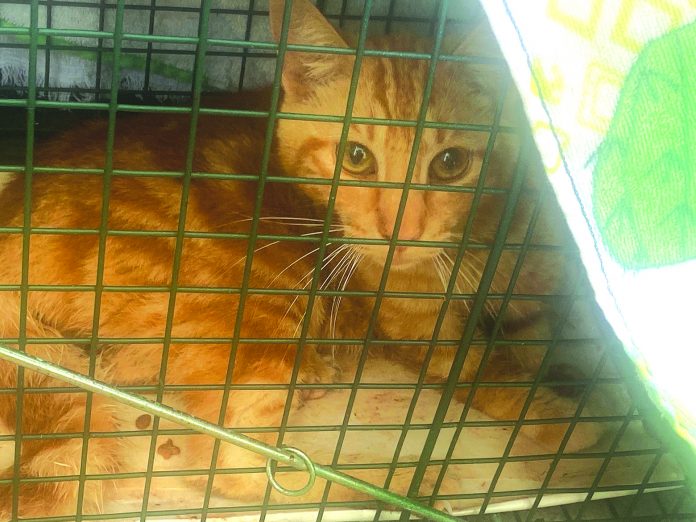
By Carol Vaughn —
Leaders of an Accomack County nonprofit group are working to improve the lives of community cats — and to reduce their numbers — by organizing trap-neuter-return events.
After holding its first Neuter Scooter event in June, in which 31 cats were spayed or neutered, the group, Northern Accomack Community Cats, held a second event July 21 in Bloxom.
The Bloxom Volunteer Fire Co. allowed the group to house the cats in a building on the fire station property during the event.
This time, 11 male cats were neutered and 10 females were spayed.
Virginia Beach SPCA employees made the long drive to the Shore for the event.
Margie Spangler and Rebecca Dinger-Tedder are co-chairs of the grassroots organization, which they started in 2019 to address the health and welfare of “community cats,” the preferred term used to describe outdoor, unowned, free-roaming cats, as well as the needs of their caregivers.
For the first six months, they focused on fundraising and getting word out about the organization, before starting TNR efforts in earnest.
To date, the group has spayed or neutered 267 cats, fostered and placed to adoption 38 kittens, and made more than 150 referrals for service for people who are outside the group’s operating location, have kittens they need re-homed, or need services the group does not provide.
Trap-Neuter-Return is the most humane option for community cats and the healthiest option for humans around them, according to the group.
Trapping and relocating feral cats, rather than neutering them and releasing them back to their original location, does not work in the long run, according to Dinger-Tedder.
Relocation creates a vacuum effect in the area from which the cats were taken, allowing other feral cats to move in.
In contrast, a colony of neutered or spayed cats will keep out other feral cats.
A female cat can come into heat as young as four months old. It is estimated one female cat and her kittens will produce 100 more cats in a seven-year lifespan.
There are around 50 million free-roaming cats in the United States, according to the group.
Northern Accomack Community Cats covers a large area, from the county’s border with Maryland down to Onley, and east to Wattsville.
The group has done two large, three-day TNR events at Trails End, a large community in Horntown.
In addition to the larger events, the group works regularly with Pocomoke Animal Hospital twice a week, and on some Saturdays, to get more cats neutered.
They also work with others in the region.
“We don’t stop,” Spangler said.
Northern Accomack Community Cats works with the people who take care of outdoor cats in their neighborhoods, lending them traps and charging just $25 per cat for spay/neuter and a rabies vaccination.
“We teach the caregivers how to trap,” Spangler said.
“If they can, we prefer for the cat caretakers to do the trapping, for two reasons: first off, it lets us get more done because then we don’t have to be on the ground doing it, but also, a lot of the caretakers, their cats know them,” making the trapping process easier, according to Dinger-Tedder.
Laura Chuquin-Naylor and Rhudy Naylor were among those who brought cats to the event in Bloxom.
From a colony that at one time had around 40 cats, the Naylors brought five to be neutered this time.
“It has really made a tremendous difference,” said Chuquin-Naylor of the group’s efforts.
“It’s a lifesaver, it really is,” said Libby Williams, another caregiver, who brought six cats from Deep Creek to the event.
“This is the ending to the situation, because if you get them all spayed or neutered, then eventually…they’ll pass away,” she said.
Ignoring the issue of unowned, free-roaming cats “doesn’t make it go away,” Spangler said.
Dinger-Tedder said TNR is a good solution for both cat lovers and people who don’t like cats roaming their neighborhood.
“I understand the objections to TNR. It’s a difficult problem. This is the most humane, the most useful, solution we have right now,” she said, adding, “The goal of people who don’t like cats and the goal of people who do TNR is the same — we don’t want any more cats to be outside — but it’s a process. It’s going to take concentrated effort. It’s going to take funding. It’s going to take people being on board, whether you love or hate cats, and then we can all get what we want.”
The organization is never without a waiting list and easily could do three times the work being done now if funding and more providers were available, Dinger-Tedder said, adding, “The need is great and the avenues are few on the Shore.”
Northern Accomack Community Cats’ website is https://www.accomackcats.org/, and the group is on Facebook and Instagram. Upcoming events are announced.
A volunteer form is on the website at https://www.accomackcats.org/volunteerform
For information, call 757-894-5644 or email [email protected]
To donate to help cover the costs of bringing the mobile unit to northern Accomack County this summer, visit the group’s Fundly: https://fundly.com/northern-accomack-community-cats, donate via PayPal: paypal.me/NACCats, or mail a check: P.O. Box 83, New Church, VA 23415.


